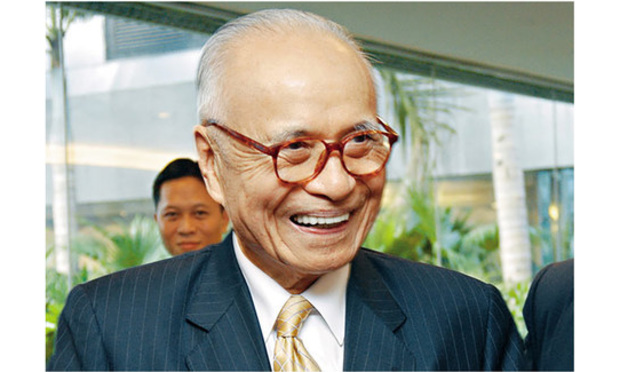Dead Billionaire's Daughter Wins First-of-Its Kind Dispute Over Appellate Costs
In a case addressing the opportunity costs of someone securing a bond to pursue an appeal, a California court has upheld a $1.4 million appellate cost award for one of the daughters of a Hong Kong industrial tycoon Chen Din-Hwa.
February 06, 2019 at 03:13 PM
3 minute read
 Chen Din-Hwa
Chen Din-Hwa
In a win for lawyers at Gibson, Dunn & Crutcher, a California appeals court has upheld a $1.4 million appellate cost award for one of the daughters of a Hong Kong industrial tycoon.
The Second District Court of Appeal on Monday held that Angela Sabella, daughter of deceased billionaire Chen Din-Hwa, was entitled to costs she incurred securing a letter of credit to post bond while pursuing an appeal in her dispute with one of the many companies her father owned, Rostack Investments Inc.
The company's lawyers at Mayer Brown had argued that Sabella wasn't entitled to the appellate costs because cheaper alternatives for posting bond, including putting up more than $77 million of her own cash as collateral, were available. They also argued that the appellate fee judgment was entered prematurely since a trial in the underlying dispute remains pending.
But, in a 17-page opinion authored by Justice Larry Rubin, the court turned back both of Rostack's arguments. In particular, the court found that “the mere fact that an alternative procedure, which would have been less expensive, was available does not mandate that the option chosen was unreasonable or unnecessary.”
The court, in an issue of first impression, found that it was appropriate to consider Sabella's “opportunity costs” when assessing the costs she incurred in securing the bond.
“It is reasonable for the appellant to choose the method that is cost-effective based on its own financial situation; not to be forced to choose what might be best for the respondent,” Rubin wrote.
Gibson Dunn's Julian Poon, who argued the appeal for Sabella at the Court of Appeal, said in an email statement that the ruling “clarifies the law in significant ways, including underscoring that appellants need not select the absolute least expensive means of posting an appeals bond and making clear that appellate awards of costs on appeal are final and immediately enforceable once entered and before further proceedings in the trial court (e.g., a trial) have taken place.”
Mayer Brown's Neil Soltman and John Nadolenco, who represent Rostack Investments in the case, didn't respond to email messages seeking comment.
The underlying dispute centers on a loan Rostack made to Sabella to purchase a ranch in Utah as an investment property in the 1990s. Sabella and her lawyers have claimed that her father forgave the loan in 2005 before his death in 2012.
Rostack, however, filed suit against Sabella in 2009, well prior to Chen's death. Sabella and her legal team have argued that the suit was filed as retribution by her sister, Vivien Chen, an executor of their father's estate. (Gibson Dunn's Poon called Monday's ruling the “latest phase of the contentious, cross-border litigation brought by shell companies and other instrumentalities controlled by her younger sister, Vivien, and those allied with her.”) Sabella contends her sister was upset with her for initiating a Hong Kong court proceeding that led to their father being declared mentally incompetent in 2008.
Rostack initially secured summary judgment against Sabella in 2014 for $51.9 million plus $6.5 million in attorney fees. But in the decision that led to the appellate cost award, the Court of Appeal in 2016 reversed that judgment and ruled that Sabell could raise her loan forgiveness defense at trial.
This content has been archived. It is available through our partners, LexisNexis® and Bloomberg Law.
To view this content, please continue to their sites.
Not a Lexis Subscriber?
Subscribe Now
Not a Bloomberg Law Subscriber?
Subscribe Now
NOT FOR REPRINT
© 2025 ALM Global, LLC, All Rights Reserved. Request academic re-use from www.copyright.com. All other uses, submit a request to [email protected]. For more information visit Asset & Logo Licensing.
You Might Like
View All
'It's Not Going to Be Pretty': PayPal, Capital One Face Novel Class Actions Over 'Poaching' Commissions Owed Influencers

'Tragedy of Unspeakable Proportions:' Could Edison, DWP, Face Lawsuits Over LA Wildfires?
7 minute read

Meta Hires Litigation Strategy Chief, Tapping King & Spalding Partner Who Was Senior DOJ Official in First Trump Term
Trending Stories
- 1'It's Not Going to Be Pretty': PayPal, Capital One Face Novel Class Actions Over 'Poaching' Commissions Owed Influencers
- 211th Circuit Rejects Trump's Emergency Request as DOJ Prepares to Release Special Counsel's Final Report
- 3Supreme Court Takes Up Challenge to ACA Task Force
- 4'Tragedy of Unspeakable Proportions:' Could Edison, DWP, Face Lawsuits Over LA Wildfires?
- 5Meta Pulls Plug on DEI Programs
Who Got The Work
Michael G. Bongiorno, Andrew Scott Dulberg and Elizabeth E. Driscoll from Wilmer Cutler Pickering Hale and Dorr have stepped in to represent Symbotic Inc., an A.I.-enabled technology platform that focuses on increasing supply chain efficiency, and other defendants in a pending shareholder derivative lawsuit. The case, filed Oct. 2 in Massachusetts District Court by the Brown Law Firm on behalf of Stephen Austen, accuses certain officers and directors of misleading investors in regard to Symbotic's potential for margin growth by failing to disclose that the company was not equipped to timely deploy its systems or manage expenses through project delays. The case, assigned to U.S. District Judge Nathaniel M. Gorton, is 1:24-cv-12522, Austen v. Cohen et al.
Who Got The Work
Edmund Polubinski and Marie Killmond of Davis Polk & Wardwell have entered appearances for data platform software development company MongoDB and other defendants in a pending shareholder derivative lawsuit. The action, filed Oct. 7 in New York Southern District Court by the Brown Law Firm, accuses the company's directors and/or officers of falsely expressing confidence in the company’s restructuring of its sales incentive plan and downplaying the severity of decreases in its upfront commitments. The case is 1:24-cv-07594, Roy v. Ittycheria et al.
Who Got The Work
Amy O. Bruchs and Kurt F. Ellison of Michael Best & Friedrich have entered appearances for Epic Systems Corp. in a pending employment discrimination lawsuit. The suit was filed Sept. 7 in Wisconsin Western District Court by Levine Eisberner LLC and Siri & Glimstad on behalf of a project manager who claims that he was wrongfully terminated after applying for a religious exemption to the defendant's COVID-19 vaccine mandate. The case, assigned to U.S. Magistrate Judge Anita Marie Boor, is 3:24-cv-00630, Secker, Nathan v. Epic Systems Corporation.
Who Got The Work
David X. Sullivan, Thomas J. Finn and Gregory A. Hall from McCarter & English have entered appearances for Sunrun Installation Services in a pending civil rights lawsuit. The complaint was filed Sept. 4 in Connecticut District Court by attorney Robert M. Berke on behalf of former employee George Edward Steins, who was arrested and charged with employing an unregistered home improvement salesperson. The complaint alleges that had Sunrun informed the Connecticut Department of Consumer Protection that the plaintiff's employment had ended in 2017 and that he no longer held Sunrun's home improvement contractor license, he would not have been hit with charges, which were dismissed in May 2024. The case, assigned to U.S. District Judge Jeffrey A. Meyer, is 3:24-cv-01423, Steins v. Sunrun, Inc. et al.
Who Got The Work
Greenberg Traurig shareholder Joshua L. Raskin has entered an appearance for boohoo.com UK Ltd. in a pending patent infringement lawsuit. The suit, filed Sept. 3 in Texas Eastern District Court by Rozier Hardt McDonough on behalf of Alto Dynamics, asserts five patents related to an online shopping platform. The case, assigned to U.S. District Judge Rodney Gilstrap, is 2:24-cv-00719, Alto Dynamics, LLC v. boohoo.com UK Limited.
Featured Firms
Law Offices of Gary Martin Hays & Associates, P.C.
(470) 294-1674
Law Offices of Mark E. Salomone
(857) 444-6468
Smith & Hassler
(713) 739-1250






